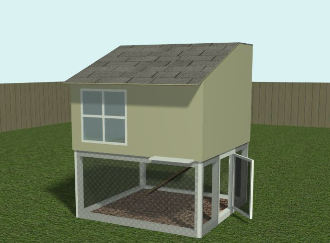Your hen house plans should definitely incorporate current standards of green planning and sustainability. First on the list is power consumption. In a few years, solar power will be mature enough to reach pretty hard set quantities in terms of economies of scale and critical mass in the market, in order to bring down prices for the everyday farmer or chicken enthusiast. Today, solar panels can be granted tax credits by various city, state and federal agencies and programs. Check with these respective agencies’ websites for more details on these credits. If you’re interested in more subsidies, you could check the private foundation and charity sector for more financial relief on investing into early adoption solar power solar cell technology for your hen house.
Another thing you can look into in terms of the future of your hen house is composting. Today there are extremely cheap and cost effective methods and mechanisms for composting. All that’s really required is a relatively automatic way of collecting the chicken manure.
Some burgeoning amateur chicken farmers try to do this manually, but this is not feasible if you are a hobbyist and have a day job, or can’t afford staff to tend to this intra daily task. What you should install in your hen house is a trap piping system that collects the manure into a tank that store the manure for integration into the general heap of compost, wherever that might be.
If your concerns aren’t on the green initiatives, then you might consider designs by industrial farmers that might be both cost effective and practical for amateur farmers to implement, such as an automated design for stacking stories upon stories of chickens in a sort of chicken hen condominium.
In this setup, chicken hens are stacked in a sort of vending machine style, where chickens can be rotated according to needs, such as cleanings, swapping, etc.
For your plans regarding hen houses you might also consider or revamp where you stand and qualify on certain government subsidies, especially as an amateur dabbling in the agricultural business. You might qualify for a subsidy based on the location of the hen house, the size of the hen house, or even what you feed the hens.
What you feed your hens is incredibly important. Try to stay away from the temptation of following the incredibly bad practices of some rogue farmers, such as feeding chicken leavings back to them. Another bad practice that you don’t want to get into the habit of doing is feeding dead chickens to your life chickens. You also don’t want to get into the habit of over pumping, so to speak, chicken hens full of steroids and antibiotics. This common practice amongst rogue farmers has the objective in mind to meat and beef up their lot without actually putting in the time and money to raise chickens properly. The chickens however will likely contract tumors that will infect the rest of the lot. So this very, very hasty decision and plan will definitely not pay off in the future for your hen house.
For more information on hen house plans, please visit our building chicken coops center.
More Hen House Articles



Leave a Reply